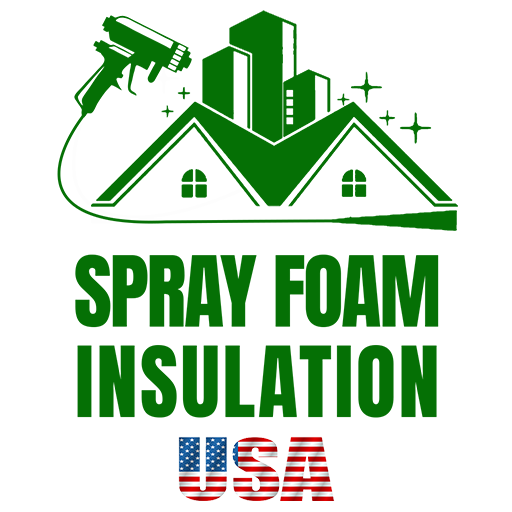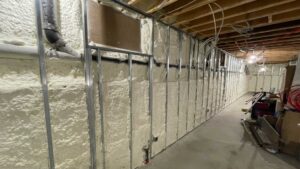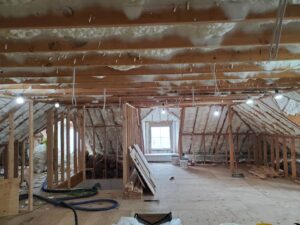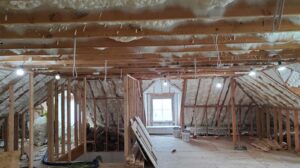Quick Tips for Choosing Commercial Insulation Services:
– Determine your insulation needs based on building size, type, and energy goals.
– Explore options like spray foam, cellulose, and fiberglass to fit your project.
– Look for contractors with proven experience and positive customer reviews.
– Consider long-term savings over initial costs.
– Ensure materials used are eco-friendly for a healthier planet.
Choosing the right insulation service for your commercial space in NY and NJ isn’t just about comfort; it’s a decision that impacts your energy bills, carbon footprint, and even the planet. With energy costs on a rollercoaster and global emissions a pressing concern, getting your commercial insulation right can mean saving money and taking a step towards sustainability.
Whether it’s keeping the heat in during the brisk winters or ensuring your air conditioning isn’t fighting against the heat of summer, the right insulation acts like a thermal blanket for your building. But not all insulation services are created equal. It’s essential to choose a service that meets your specific needs – from the type of insulation material to the experience level of the contractor.

We’ll dive into how you can understand your insulation needs, evaluate contractor expertise, assess materials for eco-friendliness, and ultimately make an informed choice to protect your bottom line and the planet.
Understand Your Insulation Needs
When it comes to insulating your commercial building, knowing your needs is the first step to making the right decision. This isn’t just about picking a material. It’s about understanding how commercial insulation differs from residential, adhering to building codes, and maximizing energy efficiency.
Types of Insulation
Commercial vs. Residential: The main difference lies in scale and specific requirements. Commercial buildings often have larger spaces, higher ceilings, and different HVAC systems compared to residential homes. This means the insulation needs are unique, focusing more on creating a consistent temperature across vast spaces and complying with stricter fire safety and energy codes.
Building Codes: Every area has its own set of building codes that dictate the minimum insulation requirements. These codes ensure safety, energy efficiency, and environmental protection. For commercial buildings, adhering to these codes is not just about compliance; it’s about optimizing your building’s performance and minimizing energy costs.
Energy Efficiency: The right insulation can significantly reduce heating and cooling costs. It acts as a barrier, keeping the desired temperature inside and reducing the strain on your HVAC system. This is not only good for your wallet but also for the environment.
Spray Foam Insulation: A standout choice for many commercial projects, spray foam insulation provides an excellent air seal, reducing air leakage more effectively than many other types. It comes in two main types: open-cell and closed-cell, each with its specific applications and benefits. Open-cell is great for soundproofing, while closed-cell offers superior moisture resistance and structural support.
Cellulose Insulation: Made from recycled newspaper and treated with fire retardants, cellulose is an eco-friendly option. It’s dense, providing a good thermal barrier and excellent soundproofing qualities. However, ensure it’s properly installed to avoid settling over time, which can reduce its effectiveness.
Fiberglass Insulation: One of the most commonly used types, fiberglass, is made from fine glass fibers. It’s available in batts and rolls or as loose-fill. It’s cost-effective, easy to install, and provides good thermal and acoustic insulation. However, it requires proper handling to avoid irritation from the glass fibers.
Choosing the right type of insulation for your commercial building involves considering these factors and understanding how each insulation type aligns with your specific needs. Whether it’s the robust energy efficiency and moisture resistance of closed-cell spray foam, the eco-friendliness and soundproofing qualities of cellulose, or the versatility and affordability of fiberglass, each material has its place in the commercial insulation landscape.
The goal is to enhance your building’s energy efficiency, comply with building codes, and ensure a comfortable environment for its occupants. Consulting with a professional commercial insulation services provider can help you navigate these choices and find the best solution for your project.
Evaluate Contractor Expertise
Importance of Hiring Professionals
When you’re looking into commercial insulation services, the expertise of the contractor you choose is not just important—it’s essential. Let’s break down why.
Certifications: Certifications are like a professional’s badge of honor. They show that the contractor has not only received formal training but also passed assessments that prove their knowledge and skills in insulation services. Certifications ensure that the person working on your building knows what they’re doing, adhering to the latest standards and practices in the industry.
Experience: There’s no substitute for experience. A contractor with years of experience has likely seen and solved a myriad of insulation challenges. This depth of experience means they can anticipate and avoid common pitfalls, ensuring a smoother project for your commercial property.
Project Portfolio: A look at a contractor’s past projects gives you a glimpse into their capability and quality of work. It’s like a sneak peek into your project’s potential future. A diverse and successful project portfolio is a strong indicator of a contractor’s ability to deliver on your insulation needs.
Compliance: The world of commercial insulation is riddled with codes and regulations. These are in place to ensure safety, energy efficiency, and environmental protection. Professionals stay up-to-date with these regulations, ensuring your project won’t hit a snag due to non-compliance, which could lead to fines or redoing the work.
Proper Installation: The best insulation material can’t do its job if it’s not installed correctly. Professional installers understand the nuances of how different materials should be applied to maximize their effectiveness. This know-how translates into better energy efficiency for your building, which means lower energy bills.
Energy Savings: The goal of installing or upgrading insulation is to save on energy costs. Professionals can help you choose the right type of insulation for your specific needs, considering factors like climate and building design. This tailored approach ensures that you’re not just insulated but optimized for energy savings.
In conclusion, the expertise of your commercial insulation contractor is crucial. It’s the difference between a job done and a job well done. Hiring a professional with the right certifications, experience, and a solid project portfolio ensures compliance, proper installation, and maximizes your energy savings. This isn’t just about insulating your building; it’s about investing in its future.
Keep these considerations in mind. They are your guideposts to making an informed decision about who will handle your commercial insulation needs.
Assess Insulation Materials
When it comes to commercial insulation services, the material you choose is as crucial as the contractor you hire. Let’s dive into Spray Foam Insulation—a popular choice for its versatility and performance.
Spray Foam Insulation
Spray foam stands out for its exceptional ability to seal leaks and insulate simultaneously. But not all spray foam is created equal. Here’s what you need to know:
-
Eco-Friendly Options: In today’s world, going green isn’t just nice—it’s necessary. Spray foam options like Heatlok Soy® are made from renewable resources, making them an eco-conscious choice. They help reduce the carbon footprint of your building by using materials like soy. This isn’t just good for the planet; it’s good for your conscience and company image.
-
R-Value: This is all about resistance to heat flow. The higher the R-value, the better the insulation performance. Spray foam typically offers a higher R-value per inch than traditional insulation materials. This means better thermal insulation and energy efficiency for your commercial building. It’s a win-win situation—reducing energy bills while keeping the indoor climate comfortable.
-
Fire Retardancy: Safety first, always. Commercial buildings need to meet strict fire codes. Spray foam insulation like Intumenscent Coatings can offer fire retardant properties. This adds an extra layer of safety by slowing down the spread of fire, giving occupants more time to evacuate in case of an emergency.
-
Open Cell vs. Closed Cell: Here’s where it gets technical but stay with me. Open cell spray foam is softer and more flexible. It’s great for soundproofing but less effective as a vapor barrier. On the other hand, closed cell spray foam is denser, offers higher R-value, and acts as a vapor barrier. For commercial buildings, closed cell is often the go-to for exterior applications, while open cell might be used for interior partitions for its acoustic properties.
Choosing between open cell and closed cell depends on your specific needs—whether it’s maximizing energy efficiency, meeting fire safety standards, or reducing noise levels.
When assessing insulation materials for your commercial project, consider the environmental impact, the insulation’s effectiveness (R-value), safety features (fire retardancy), and the type of spray foam that best fits your needs (open cell vs. closed cell). These factors will guide you to the right insulation choice, ensuring your building is not only energy-efficient but also safe and compliant with regulations.
As we proceed, the right insulation material can significantly impact your building’s energy consumption, safety, and comfort. Next, we’ll explore the importance of considering the total cost of insulation, including installation, long-term savings, and maintenance.
Consider the Total Cost
When diving into commercial insulation services, it’s crucial to look beyond the initial price tag. The true cost of insulation encompasses several factors, including installation, long-term savings, maintenance, material, labor, and building size. Understanding these elements can help you make an informed decision that balances upfront expenses with future benefits.
Cost Factors
-
Installation: The process of installing insulation is not a simple task. It requires skilled professionals who know how to handle the materials correctly and ensure that they fit the unique needs of your commercial building. The complexity of your project can significantly affect the cost. For instance, intricate designs or hard-to-reach areas may require more time and specialized equipment, driving up the price.
-
Long-term Savings: Investing in high-quality insulation pays off over time. Properly insulated buildings require less energy for heating and cooling, leading to substantial savings on utility bills. A study mentioned in our research highlights that buildings with spray foam insulation, for example, see a noticeable reduction in energy consumption.
-
Maintenance: The durability and maintenance needs of the insulation material also factor into the total cost. Some materials, like spray foam, have a higher upfront cost but offer lower maintenance and longer lifespans, reducing the need for frequent replacements or repairs.
-
Material: The cost of insulation materials varies widely. Spray foam insulation, while initially more expensive, provides excellent air sealing and insulation properties, which can justify its cost with energy savings and improved building performance. On the other hand, materials like fiberglass are less expensive upfront but may not provide the same level of energy efficiency or durability.
-
Labor: The expertise of the installation team plays a critical role in the success of your insulation project. Skilled labor may come at a premium, but the investment ensures that your insulation is installed correctly, maximizing its effectiveness and longevity.
-
Building Size: Finally, the size of your commercial building directly impacts the cost of insulation. Larger buildings require more materials and labor, increasing the overall expense. However, economies of scale can sometimes reduce the cost per square foot for very large projects.
In conclusion, when considering commercial insulation services, evaluate the total cost, not just the upfront expenses. By understanding the factors that contribute to the cost, you can make a decision that ensures your building is efficiently insulated, saving you money and enhancing comfort in the long run. We’ll delve into the importance of reading customer reviews and testimonials to gauge the satisfaction levels and quality of work provided by insulation contractors.
Read Customer Reviews and Testimonials
Importance of Feedback
When you’re on the lookout for commercial insulation services, diving into customer reviews and testimonials is a must. Why? Because they give you the real scoop on what it’s like to work with a company. Let’s break down why feedback matters so much.
Satisfaction Levels
First off, reviews are a goldmine for understanding how happy people are with the services they received. For example, a customer named JIN SEUK shared how the insulation from Spray Foam Insulation USA passed inspection with flying colors and made a noticeable difference in their home’s comfort. This kind of feedback tells you the company delivers on its promises.
Problem Resolution
Things don’t always go smoothly, and that’s okay. What’s important is how a company handles these bumps in the road. Look for stories in reviews where something went wrong, and see how the company stepped up. Did they fix the issue promptly? Were they easy to communicate with? This tells you a lot about their commitment to customer satisfaction.
Quality of Work
You want your insulation to last and perform well, right? Reviews can tell you whether a company’s work stands the test of time. Customers like Eric Herman, who praised the professional team and the quality of work, can give you confidence that you’re choosing a contractor who won’t cut corners.
Trustworthiness, Reliability, Professionalism
These three traits are non-negotiable. Reviews can highlight whether the company shows up on time, provides clear and honest communication, and conducts business with integrity. For instance, the detailed account from JIN SEUK about the entire process, from scheduling to noticing the effects of the insulation, showcases the company’s reliability and professionalism.
Reading through customer reviews and testimonials gives you a clearer picture of what to expect. You’ll learn not just about the end result, but about the journey there: how the company interacts with clients, how they solve problems, and how seriously they take their commitment to quality work.
As we move to the next section, keep in mind that choosing a company with positive feedback in these areas can lead to a smoother, more satisfying insulation project experience.
Frequently Asked Questions about Commercial Insulation Services
When it comes to choosing commercial insulation services, you likely have a few questions. Let’s dive into some of the most common inquiries to help you make informed decisions.
Why is commercial insulation important?
Commercial insulation plays a crucial role in reducing energy costs and improving the comfort of a building. Proper insulation acts like a barrier, keeping the desired temperature inside and the unwanted temperatures outside. This means your heating and cooling systems don’t have to work as hard, leading to significant energy savings. Moreover, insulation can also soundproof your space, making it a better environment for everyone inside.
How long does commercial insulation last?
The lifespan of commercial insulation depends on the type used:
- Fiberglass insulation can last about 20 to 30 years if it’s kept dry and undisturbed.
- Spray foam insulation, on the other hand, can last up to 80 years or more, making it a more durable option.
However, the actual lifespan can vary based on factors like installation quality and exposure to moisture. Regular inspections and maintenance can help extend its lifespan.
What is the best type of insulation for commercial buildings?
The “best” insulation depends on your building’s specific needs, including its design, location, and how you use it. However, spray foam insulation is often recommended for commercial applications due to its high R-value (a measure of thermal resistance), durability, and ability to air seal buildings effectively. It comes in two types:
- Open cell spray foam is lighter and is great for soundproofing.
- Closed cell spray foam is denser, offers higher R-value, and adds structural strength to walls.
Both types provide excellent thermal insulation and air sealing, making them versatile options for many commercial buildings.
Choosing the right insulation and contractor can make a big difference in your building’s energy efficiency, comfort, and even its carbon footprint. Keep these FAQs in mind as you consider your options for commercial insulation services.
Conclusion
When it comes to commercial insulation services, making the right choice can significantly impact your building’s energy efficiency, comfort, and sustainability. At Spray Foam Insulation USA, we understand the importance of these factors for your business. Our commitment to excellence, combined with over two decades of experience, positions us as a leader in providing superior insulation solutions.
We offer a comprehensive range of insulation options, including spray foam, cellulose, and fiberglass, tailored to meet the specific needs of your commercial building. Our expertise ensures that your project not only complies with building codes but also achieves optimal energy savings and environmental benefits.
Why Choose Spray Foam Insulation USA?
-
Expertise and Experience: Our team is highly trained and experienced in the latest insulation techniques and materials. We have successfully completed a wide variety of commercial projects, from offices to hospitals and food production facilities.
-
Quality Materials: We use only the highest quality insulation materials, ensuring effective thermal insulation and air sealing. Our spray foam options, including open cell and closed cell, are particularly effective for a wide range of commercial applications.
-
Commitment to Sustainability: We prioritize eco-friendly options and practices, helping your business reduce its carbon footprint while improving energy efficiency.
-
Customer Satisfaction: Our dedication to customer service is reflected in the positive feedback and testimonials we receive. We’re committed to exceeding your expectations on every project.
-
Comprehensive Services: From energy audits to custom insulation solutions, we offer a full suite of services to ensure your building is properly insulated. Our additional offerings, like fireproofing and soundproofing, provide extra layers of protection and comfort.
Choosing the right commercial insulation services is crucial for the long-term performance and sustainability of your building. With Spray Foam Insulation USA, you can rest assured that your insulation needs are in expert hands. Our team is ready to provide you with a detailed consultation, helping you select the best insulation options for your specific requirements.
Discover how we can help you achieve significant energy savings, enhance comfort, and contribute to a healthier environment. Visit our commercial insulation services page to learn more and get started on improving your building’s performance today.
The right insulation choice not only impacts your immediate comfort and energy bills but also plays a crucial role in the long-term value and sustainability of your commercial property. Let us help you make an informed decision that benefits your business now and in the future.






